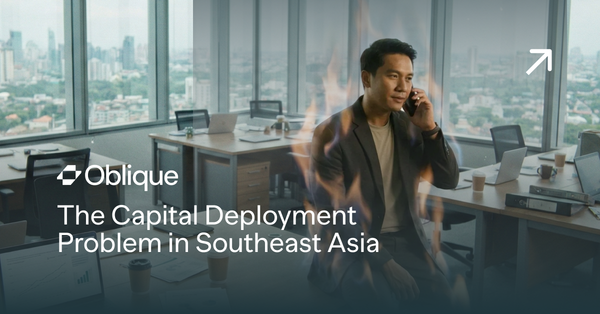Southeast Asia’s Tech Playbook Is Changing—Here’s What You Missed
Sovereign AI hubs, licensed crypto rails, and cross-border fintech plays defined SEA’s tech landscape this week. While VC funding stays cautious, the region is doubling down on regulation-aligned infrastructure that’s built to scale with national growth.

The past seven days illustrated Southeast Asia’s twin-track tech story: heavyweight capital bets on AI and fintech infrastructure, plus a growing crop of cross-border, compliance-first experiments in crypto, digital banking, and upskilling. While total VC volumes remain muted, momentum is clearly pivoting toward scalable, regulation-aligned platforms that can plug straight into regional growth themes.
Below are the eight moves that mattered most.
NVIDIA, Indosat & Cisco Plant a Sovereign AI Flag in Indonesia
Indonesia unveiled an “AI Center of Excellence,” a US$200 million campus-cloud partnership between telco Indosat Ooredoo Hutchison, NVIDIA, and Cisco1. The facility bundles H100 clusters, 5G edge zones, and a target to train 1 million Indonesians in AI skills by 2027.
Why it matters: Jakarta is leap-frogging scarce on-premise compute by fusing sovereign control with global hyperscale know-how. Expect the model—public-private capex plus upskilling quotas—to become ASEAN’s template for “AI without brain-drain,” forcing local cloud rivals to counter-invest.
Europe-Backed Digital Bank Seeks Philippine License
The Bangko Sentral ng Pilipinas confirmed that a Europe-based neobank has completed its paperwork to become one of four new digital banks allowed post-moratorium 2. The applicant’s pitch centers on AI-driven credit-scoring for underserved segments.
Why it matters: Manila’s regulators are picking winners able to balance inclusion with rigorous data-governance. A foreign player anchoring in the Philippines ups competitive pressure on incumbent e-wallet giants Maya and GCash—especially around SME lending rails.
East Ventures Bets on AI Credit Scoring Startup Sxored
Indonesia’s most active VC led an undisclosed pre-Series A into Sxored, an AI platform that ingests unstructured data to underwrite thin-file borrowers 3. Early pilots with neo-banks claim a 28% lift in approval rates without higher NPLs.
Why it matters: In a funding drought, investors are chasing startups that instantly bolt onto banks’ balance sheets. If Sxored scales, it could rewrite credit underwriting norms and sharpen East Ventures’ thesis around “AI pipes over consumer apps.”
Malaysia’s Hartamodal Pours Capital into India’s Connect & Heal
Hartamodal’s Dana Impian fund joined a new round in Delhi-based health-tech Connect & Heal, founded by Malaysian siblings 4. The deal signals Hartamodal’s strategy to back Malaysian diaspora founders abroad, with a view to re-importing proven models.
Why it matters: Amid plateauing local exits, Malaysian funds are shifting toward “external incubation,” treating India as a sandbox before rolling products—tele-primary care in this case—back into Malaysia’s National Health Futures roadmap.
🌏 Region-Wide Ripples
Startup ASEAN Platform Goes Live Under Malaysia’s 2025 Chairmanship
MOSTI and Cradle officially launched the Startup ASEAN portal, a one-stop gateway for funding, talent, and cross-border data rooms 5. The platform is the first concrete deliverable under “ASEAN Startup Technology Ignite 2025.”
Why it matters: If executed well, Startup ASEAN could erode the Jakarta-Singapore duopoly by routing deal-flow from secondary cities straight to regional investors, echoing the EU’s single-market effect on scale-ups.
Coins.ph & HashKey Open 24/7 HK–Philippines Crypto Remittance Rail
Licensed exchange Coins.ph teamed with Hong Kong-regulated HashKey to create an always-on corridor converting PHP⇄HKD with on-chain settlement 6. The integration is marketed as a compliance-first alternative to informal channels.
Why it matters: By stitching together two regulated endpoints, the duo may set a precedent for “gray-list safe” crypto corridors—vital as Hong Kong courts institutional crypto while Manila chases remittance cost cuts.
⚡ Undercurrents
Tether Sponsors Thailand’s Cyber Warrior Hackathon
Stable-coin issuer Tether became gold sponsor of Thailand’s Cyber Warrior university hackathon co-hosted by KMUTT and the Cyber Crime Investigation Bureau 7. The event embeds crypto-forensics modules into Thailand’s national cybersecurity syllabus.
Why it matters: Amid global scrutiny of stable-coins, Tether is buying grassroots goodwill and positioning itself as a partner for regulators—an unusual public-relations pivot that rivals Circle and Paxos may emulate.
Singapore’s Business Adaptation Grant Tackles U.S. Tariff Shock
Singapore’s Economic Resilience Taskforce rolled out a SGD100,000 co-funding scheme to help exporters retool supply chains in response to new U.S. tariffs 8. SMEs get higher match rates, and HR upskilling allowances piggyback NTUC-e2i programs.
Why it matters: The move shows how even trade-savvy Singapore is preparing for a fracturing global order. Tech manufacturers and logistics startups could find rich consulting demand in tariff navigation and friend-shoring analytics.
Vietnam Formalizes Crypto as Property—Tax Breaks Included
Hanoi passed the Digital Technology Industry Law classifying crypto as property and carving out tax incentives for blockchain startups 9. Multiple token categories and talent visas aim to stem the developer exodus.
Why it matters: Vietnam is bucking the regulatory chill seen in the U.S. and China; the law could transform Ho Chi Minh City into a regulated sandbox rivaling Dubai or Zug, pressuring neighbors to clarify their own rulebooks.
🗓️ Signals from the Ecosystem Applications Open for Accelerating Asia Cohort 12
The respected Singapore-based accelerator announced a 100-day program offering up to US$250,000 per startup with follow-on capacity 10. Demo Day lands January 2026, squarely after a projected funding trough.
Why it matters: With later-stage capital tight, seed accelerators are doubling down on disciplined fundamentals. Founders eager for capital should note tougher KPI gates and an emphasis on “default alive” unit economics.
Investor Sentiment: Selective Money, AI Premium
Q2 data shows SEA tech raised just US$2 billion—1% of global VC—yet AI startups command 5× faster revenue ramps than SaaS peers 11 12. LPs are funneling limited dry powder toward infra-grade AI and compliance-friendly fintech while consumer apps face valuation haircuts.
Why it matters: Founders chasing “growth at any cost” will struggle. Those embedding AI efficiency or regulated finance pipes can still access capital—especially if they plug into the region’s new sovereign AI and digital banking rails.
Each of these developments signals a region shrugging off venture winter by leaning into infrastructure-heavy, regulation-aligned bets—from sovereign GPU clusters to licensed crypto rails—while governments cushion SMEs against external shocks. Expect AI talent wars, compliant crypto corridors, and cross-border startup arbitrage to headline the next quarter.





